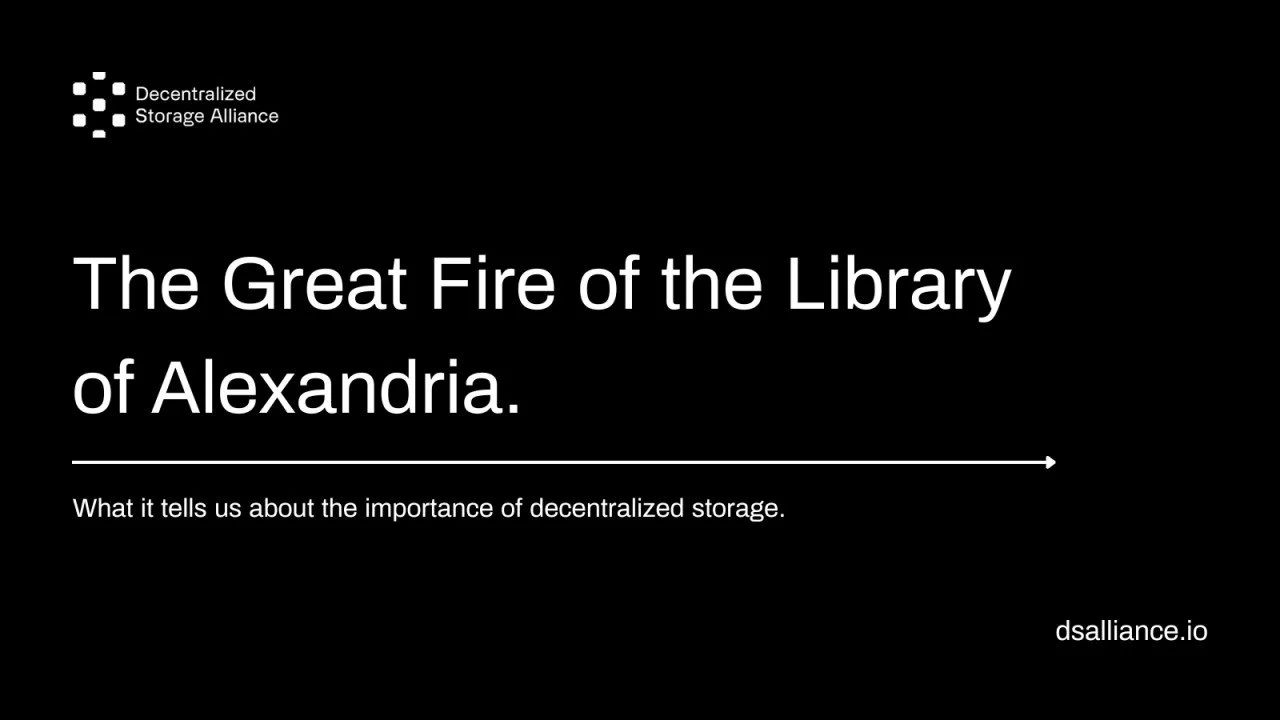What the Tragedy at the Library of Alexandria Tells Us About The Importance of Decentralized Storage
Alexandria, 48 BCE. In the chaos of Caesar's siege, flames meant to block enemy ships licked inland, reaching the Library's waterfront storehouses. Papyrus burst like dry leaves; ink rose as black smoke. Thousands of scrolls that covered topics ranging from geometry, medicine, and poetry vanished before dawn. One blaze, one building, and centuries of knowledge were ash.
The lesson landed hard and fast: put the world’s memory in a single vault, and a single spark can erase it.
Why the Library was a Beacon for the World’s Minds
Alexandria's Library powered the Mediterranean’s information network. Scholars and traders from Persia, India, and Carthage streamed through its gates. Inside, scribes translated and recopied every scroll they touched. India spoke to Athens; Babylon debated Egypt, all under one roof.
Estimates place the collection anywhere between forty thousand and four hundred thousand scrolls. However, the raw tally matters less than the ambition: to gather everything humankind had written and make it conversant in one place. Alexandria became the Silicon Valley of the Hellenistic world. Euclid refined his Elements here; Eratosthenes measured Earth’s circumference within a handful of miles; physicians mapped nerves while dramatists perfected tragedy. Each scroll was a neural thread in a vast, centralized mind—alive only so long as that single body endured.
How Did Centralization Fail?
All knowledge sat in one building. Four separate forces struck it. Each force alone hurt the Library; together they emptied every shelf.
1. War and Fire
One building held the archive, and one battle lit the match. When Caesar's ships burned, sparks crossed the quay, and scrolls turned to soot in hours.
2. Power Shifts
Rulers changed; priorities flipped. Each new regime cut funds or seized rooms for soldiers. Knowledge depended on politics, not purpose.
3. Ideological Purges
Later bishops saw pagan danger in Greek science. Statues fell first, then shelves. Scrolls that clashed with doctrine vanished by decree.
4. Simple Neglect
No fire is needed when roofs leak. Papyrus molds, ink fades. Without steady upkeep, even genius crumbles to dust.
Digital Fires Happening Today
So what has been happening in modern times that reminds us of the Library of Alexandria? A few examples come to mind.
On 12 June 2025, a misconfigured network update at Google Cloud cascaded through the wider internet. Cloudflare's edge fell over, Azure regions stalled, and even AWS traffic spiked with errors as routing tables flapped. Music streams stopped mid-song, banking dashboards froze, newsroom CMSs blinked "503." One typo inside one provider turned millions of screens blank for hours. This was proof that a single technical spark can still torch a vast, centralised stack.
Just three days earlier, on 9 June 2025, Google emailed Maps users about a different erasure notice: users must export their cloud-stored Location Users should keep any data older than 90 days in their history, or it will be deleted. Years of commutes, holiday trails, and personal memories just vanished. The decision sits with one company; the burden of preservation falls on each user.
Then in July 2025, a Human Rights Watch report detailed how Russian authorities had “doubled down on censorship,” blocking thousands of sites and throttling VPNs to tighten state control of the national internet. What a citizen can read now hinges on a government flip-switch, not on the value of the data.
Today's Solution to Alexandria is On-Chain
To shield tomorrow's knowledge, there are three key layers three complementary systems.
The first layer is IPFS. This scatters every file across a network of peers, allowing any node to serve the content through its cryptographic hash, transforming the network into a digital bookshelf. On that foundation lies Arweave. Paying once ensures the data gets etched into a ledger designed to outlast budgets, ownership changes, and hardware refresh cycles.
Finally, Filecoin provides ongoing accountability. Storage providers earn tokens only if there is continual proof that the bytes remain intact. Together, redundancy, permanence, and incentives ensure that an outage, a policy change, or a balance-sheet crunch becomes a nuisance instead of a catastrophe.
The Lesson in Hindsight
Alexandria burned because the best minds of its age had no alternative. Scrolls were physical, copies were scarce, and distance was measured in months at sea. Today, we live in a different century with better tools. If knowledge still disappears, it is by our choice, not our limits.
Every outage, purge, or blackout we suffer is a warning flare: the old risks are back, just wearing digital clothes. However, the cures already run in the background of the internet we use daily. We decide whether to rely on single servers or scatter our memories across many.
While this historic event is something of the past, the lessons we can learn from it are ever more present in today’s society. The idea of decentralized storage may pass you, but when applied to the story of Alexandria, it’s hard not to ignore.
Keep In Touch
Follow us on X: https://x.com/_DSAlliance
Follow us on LinkedIn: https://www.linkedin.com/company/decentralized-storage-alliance
Join DSA: https://www.dsalliance.io/members

